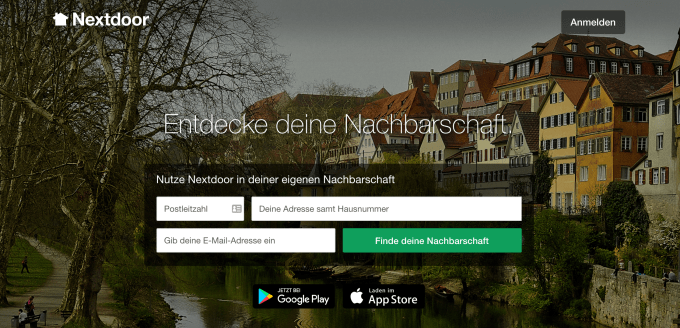Nextdoor, the social network that connects you with people in your neighborhood, is taking another step up in its global growth, after launching in the Netherlands and the UK last year. Today, the company is opening for business in Germany, the largest internet market in Europe.
The move comes as Nextdoor says it is now used in 160,000 neighborhoods across the US, UK and Netherlands, with about 145,000 of those in its home market of the US, and the company continues to grow at a steady pace.
“We are growing 100 percent year over year have done that since inception,” said co-founder and CEO Nirav Tolia in an interview. This works out to adding around 100 new neighborhoods every day. In the US, Nextdoor is in 75 percent of all U.S. neighborhoods, and since launching in the Netherlands last year, it’s in 50 percent of neighborhoods, while in the UK — where the company got a leg up when it acquired a local competitor Streetlife — Nextdoor is in 40 percent of neighborhoods.
This is solid growth, and Nextdoor is using the scale to start to introduce ads — before last year the service was essentially free of any monetization — and to step up its growth outside of its core market. The company has now raised around $210 million in funding and was last valued at $1.1 billion. Tolia said that most of its last round — $110 million raised in 2015 — is still in the bank. He added that there may be more funding efforts soon as the company sets its sights on opening for business in Asia and Latin America.
“We have plenty of cash and have always been more conservative,” he said, “but as we think about international expansion and start to get more aggressive we may consider raising money. Right now the business model is our priority.” Ads today appear to mainly be in the form of sponsored content in posts, which are being rolled out on a limited basis from national and local advertisers in users’ timelines.

In its bid to be the go-to place online for people who want to link up with their communities for local discussions, selling and buying things, and more, Nextdoor competes with a sizeable range of other entities that include Facebook’s Groups, Craigslist and homegrown forums.
Of all of these, Facebook is perhaps the most obvious. As the outsized, dominant social player in many parts of the world, its main portal and three messaging services Messenger, Instagram and WhatsApp collectively touch billions of consumers and businesses, who use these to connect with each other, share information, buy things and more.
That network effect has made Facebook into a formidable competitor for any and all other social properties that want a piece of the action: the company’s size and ubiquity means that if it decides that it’s interested in, say, what Snapchat is doing with a new video feature, it can clone it in one of its own apps, and will be likely to get a lot of amplification and use of it, sometimes at the expense of a smaller competitor’s growth.
The same could be argued for Nextdoor, which faces a strong effort from Facebook. On Facebook, it’s an easy progression for someone who is already using the social network to connect with friends and special interests, to add membership to a neighborhood group. In turn, Facebook has been ramping up adjacent features around event planning and the selling items in its marketplace to tie people into collectively using the whole service more.
“We have a tremendous amount of respect for Facebook,” Tolia said. “You can’t help but marvel at the 800-pound gorillas. But we would not be able to sleep at night if we just thought of them because we have just one percent of their people and resources.”
Instead, Nextdoor focuses on ways that it makes sense to be different from Facebook, comparing itself to LinkedIn and its ability to carve out a niche for itself in the working world. “We believe that we provide a different context to communicate with neighbors versus friends,” Tolia said. “We are different and we will continue to lean into that difference.”
In the case of Nextdoor, the company has “baked privacy and security into the model from day one”, with content ring-fenced by location, people using their real names, and a requirement to confirm your address before registering for a neighborhood. (In contrast, if you’ve ever used a Facebook Group, you’ll know that the joining process is significantly looser, and of course you can be a member of multiple groups, diluting some of the point.)
The security and privacy elements are interesting aspects of the service when you consider the problems that Facebook has had specifically in Germany but across other parts of Europe, specifically in relation to privacy and data protection issues and claims that these are not safeguarded well enough.
If Nextdoor plays its cards right, its place as the “anti-Facebook” could see it getting some stronger attention in its newest market.
And while Facebook’s algorithm today might mean you may miss some updates in a community forum, Nextdoor singular focus gives the news that is posted in your local group a prime position — and the only position, as it happens.
That has helped push Nextdoor’s reputation as the equivalent of an online “neighborhood watch” noticeboard — although that has also met with some controversy. The company has been accused of promoting racial profiling in some areas, prompting it to develop a new tool to cut down this tendency.
Along with the push to keep profiling out of the network, Nextdoor also gives users guidelines on what they can post on the site, with a push for people to be civil and not self-promote. It will be interesting to see how those lines evolve — or alternatively, remain steady — as more commercialization takes hold.
